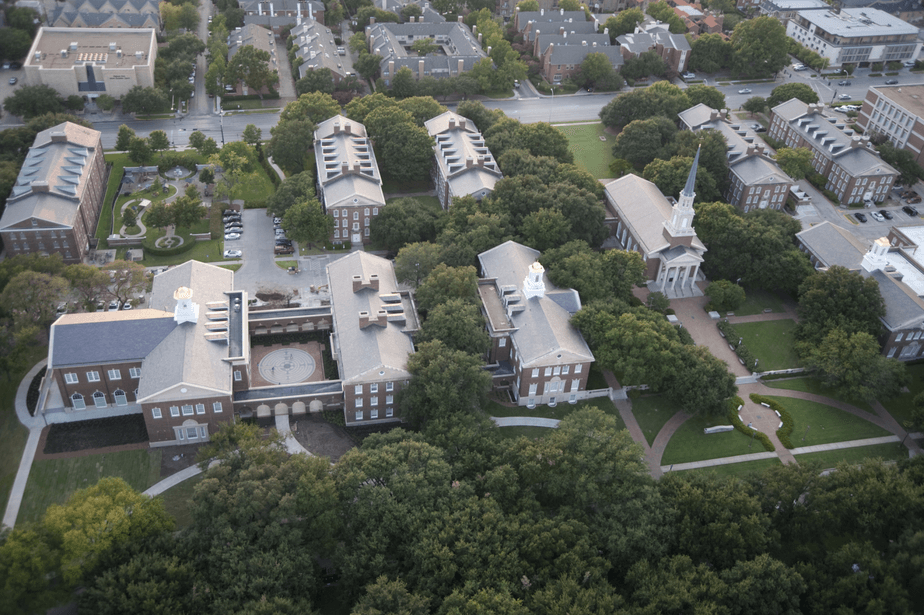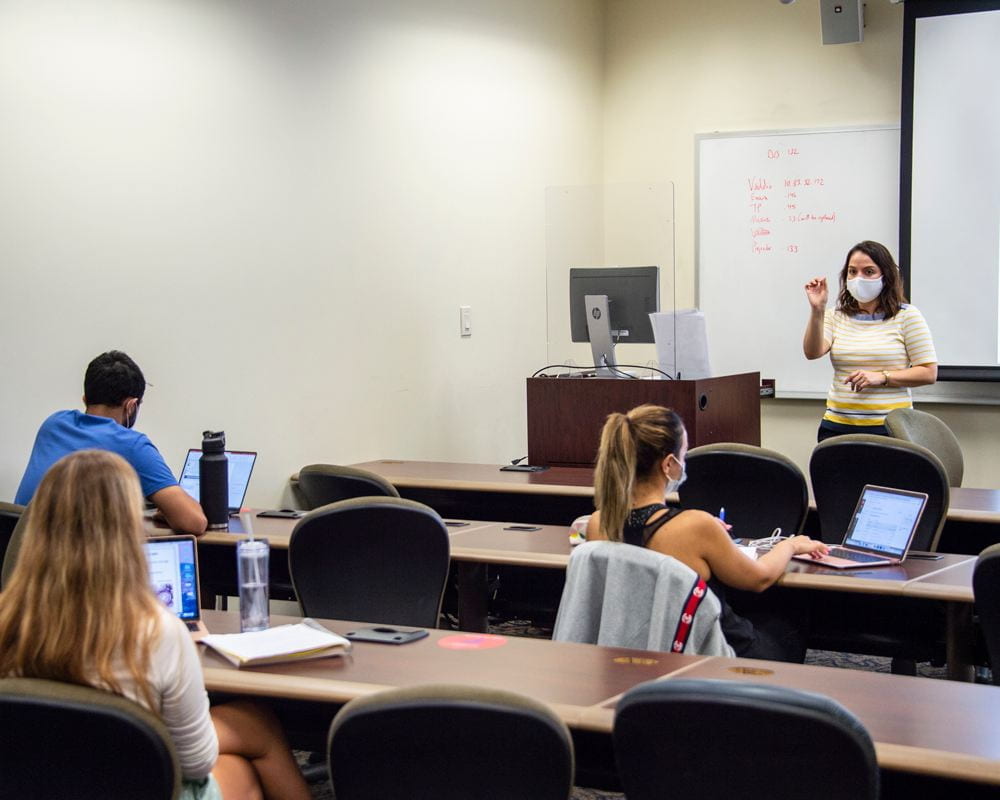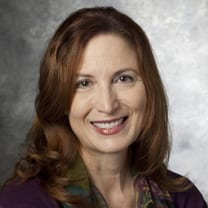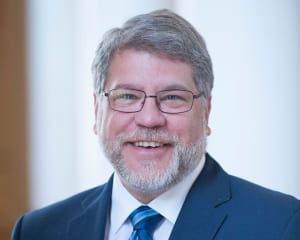Even as education grows increasingly virtual, place still matters.
That’s why Perkins’s Course of Study program continues to play a vital role in preparing local pastors at three Satellite Schools: for Spanish-speaking pastors in the Western Jurisdiction, at McMurry University and at the Oklahoma Indian Mission Conference (OIMC).
“What remains important is the cultural context of our satellite schools, particularly for the OIMC satellite for indigenous pastors, and Western Jurisdiction satellite for Spanish-speaking pastors,” said Paul Barton, Director of the United Methodist Regional Course of Study School at Perkins. “Even in a pandemic, the ministry realities don’t change. When these students come together, virtually or in-person, they are sharing their experiences and their stories of what it’s like to be in ministry in their localities and contexts.”
Satellite schools are administered directly by the Perkins Regional Course of Study School and offer courses semi-annually (spring and fall). They offer a more convenient, localized option for students who wish to complete the Course of Study program prescribed by the General Board of Higher Education and Ministry (GBHEM)– Division of Ordained Ministry of the United Methodist Church.
Course of Study programs are open to part-time and full-time licensed local pastors, as well as certified lay ministers (CLMs) who meet certain criteria. GBHEM develops the curriculum, which consists of 20 courses, and keeps central records. (Pastors typically complete licensing school first, then enroll in a Course of Study, but a few exceptions are permitted.)
Enrollment for each Satellite School is typically small – up to 20 students, which allows for personal attention and guidance as students through the process.
Oklahoma Indian Mission Satellite
Launched in March 2020, OIMC is the newest of the three satellite schools, and is open to United Methodist indigenous local pastors within the conference and beyond. (Local pastors who are not indigenous may apply, however, and are considered on a case-by-case basis.) The program met for the first time on a Saturday in March at the campus of the College of the Muscogee Nation, a public tribal college in Okmulgee, Okla.
“It was a great setting, and we hope to continue to meet there once we’re past the pandemic,” said the Rev. David Wilson, OIMC superintendent.
Due to COVID-19, the remainder of the course is being completed online, which presented some challenges for OIMC students.
“In many places across the state, especially southeastern Oklahoma, it’s difficult to get the reliable high-speed WiFi you need to get online with Zoom,” said Wilson. “We lost a few students who just did not have the capacity to join online, but that is the reality for many indigenous communities.”
Wilson added that assistance from GBHEM’s Native American Ministry Sunday Scholarship Fund helped meet some of the additional needs created by the pandemic.
The OIMC satellite’s inaugural course, 121 Bible I: Introduction, was taught by Rev. Justine Wilson, a clergy member in the OIMC conference, with an emphasis on the Native American context. When the class covered the stories of creation in Genesis, she invited students to explore the creation stories that are part of their tribal oral traditions.
“That was eye-opening for many students,” David Wilson said. “Students saw many similarities in the various creation stories. For any culture, the purpose for creation stories is similar — to answer the question, ‘Where did we come from?’”
Bible I will conclude in September, and in October, Perkins faculty member Rebekah Miles will begin teaching the next course, 122 Theological Heritage I: Introduction. She is an affiliate member of the OIMC and “a good friend and ally of ours for some time,” according to David Wilson.
Western Jurisdiction Satellite
The Western Jurisdiction Satellite program, begun in 2017, is taught in Spanish and recruits primarily from the Western Jurisdiction. It was launched after the closing of Claremont School of Theology’s Spanish-speaking COS program, which left few options for Spanish-speaking pastors. Travel to the only other Spanish-speaking programs (at Perkins or Garrett-Evangelical in Chicago) was cost-prohibitive and logistically difficult.
“The majority of these local pastors are bi-vocational and work in secular jobs,” said the Rev. David Martinez, Director of Contextual Leadership Formation for GBHEM’s Division of Ordained Ministry. “The satellite school plays an important role in building a community of ministers. Students meet others who are doing similar work and meet people from other conferences.”
The satellite program provides much-needed mentoring and guidance to Spanish-speaking students, Martinez adds.
“We encourage our students to talk to the District committee of Ordained Ministry (DCOM) to make sure they fulfill all the conference requirements,” he said. “We have become a safe space for them in their ministerial process.”
McMurry University’s Satellite School is the longest running in the Perkins program, since 2012, primarily serving students in west and northwest Texas. The program typically offers one class per semester and to date has offered 17 different courses from the COS curriculum. Last spring’s courses were taught online; this fall, the current plan is for Course of Study students to return to campus to meet three Saturdays in September, October and November.
John B. Faulkenberry Miller, Professor of Religion at McMurry, serves as Assistant Director of the program. Most of the students are pastors in the Northwest Texas, Rio Grande and Central Texas conferences. Until last spring, the program was open only to part-time local pastors, but now is open to full-time pastors as well. Courses are taught by United Methodist clergy in the Northwest Texas Conference as well as McMurry faculty.
To date, 34 students have attended the McMurry program, and six have completed the Course of Study.
“All of our students have been local pastors who were actively serving a church when they took our classes,” Miller said. “For many part-time local pastors, another advantage is that we meet on three Saturdays during the semester, as opposed to meeting at the Perkins campus in Dallas for a longer continuous block of time during the summer.”
(The Course of Study offered at Perkins in Dallas now offers courses in the fall and spring, but that is a very recent development.)
The three Satellite Schools are part of a portfolio of programs offered through the Course of Study School at Perkins, which also offers hybrid courses, in English and Spanish, which were taught fully online this past spring and summer, due to COVID-19. The Perkins Regional COSS director also oversees three extension schools in the Texas, North Texas and Arkansas Annual Conferences.
“These are not just fast track paths to ministry,” said Barton. “They offer options for people who received their calls later in life, who have jobs and other obligations, that preclude full-time residential programs.”










































































